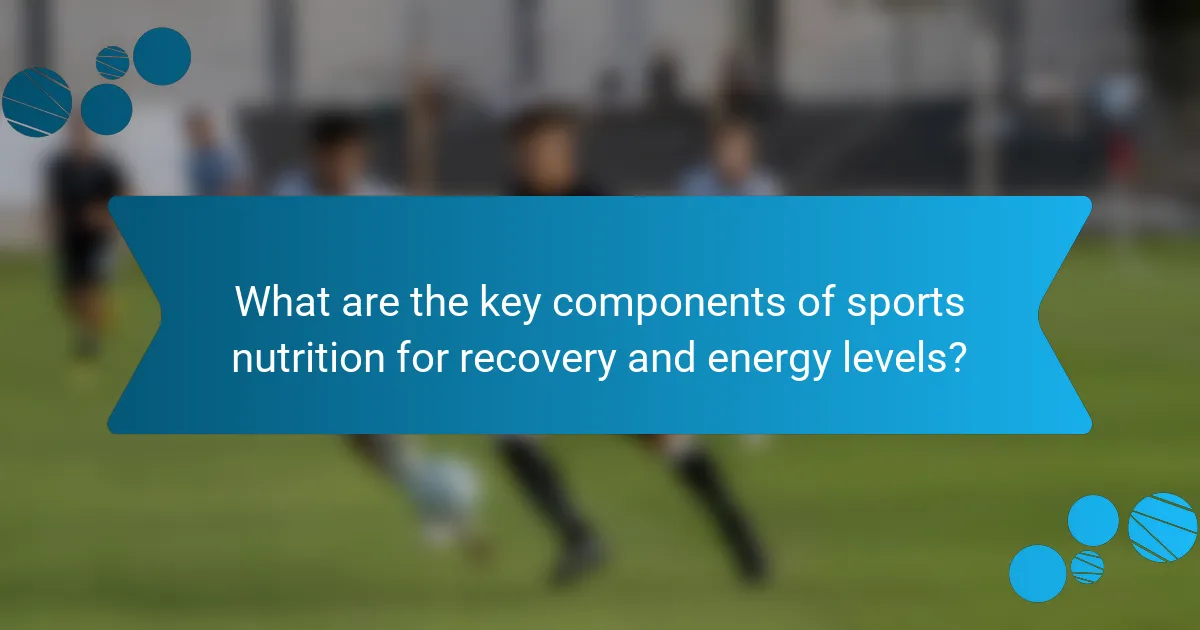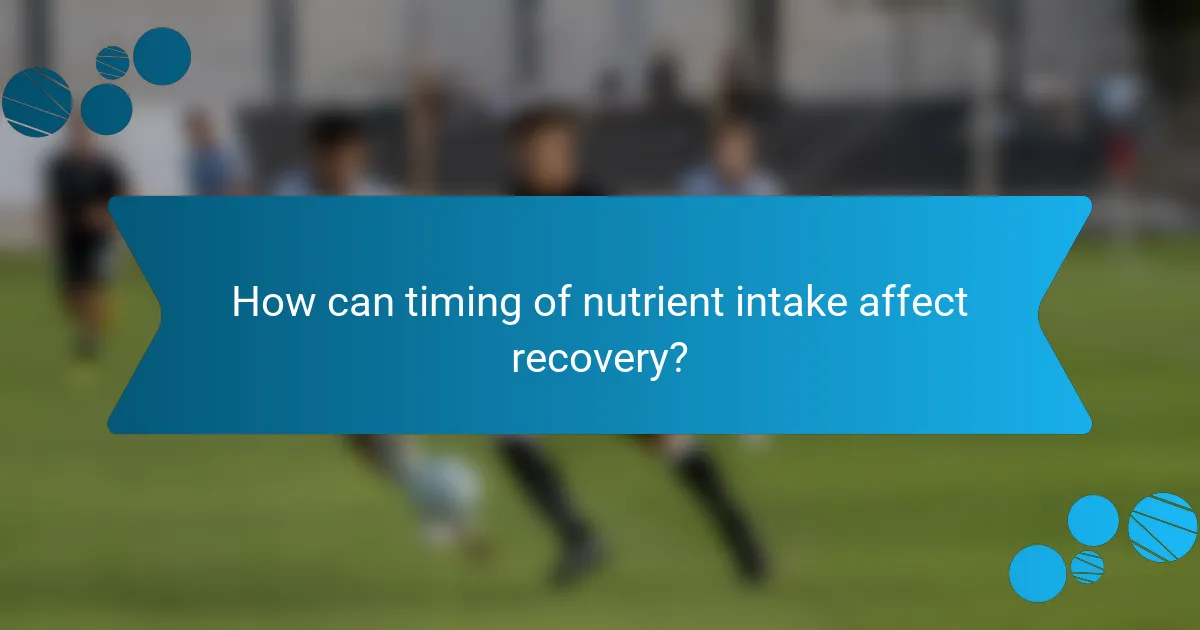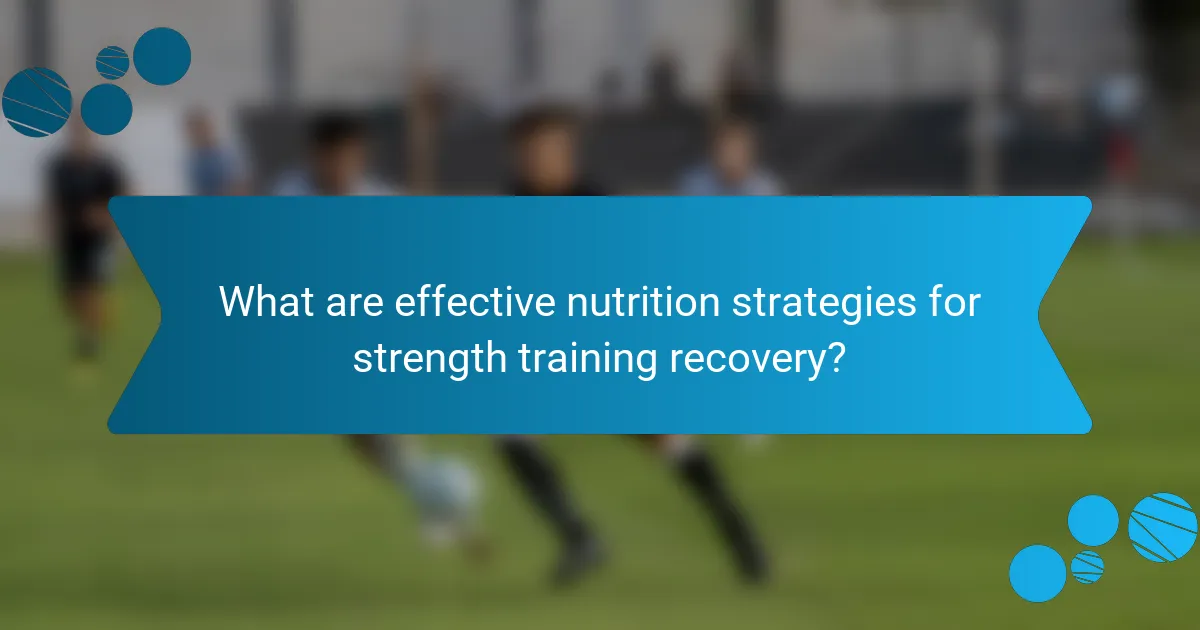Effective sports nutrition strategies are essential for enhancing recovery and energy levels in athletes. Key components include carbohydrates, proteins, and hydration, which support muscle repair and replenish glycogen stores. Timing of nutrient intake plays a crucial role in optimising recovery, while individualised approaches address unique dietary needs and challenges. Additionally, recent trends highlight the benefits of plant-based diets and technological advancements in tracking nutrition.

What are the key components of sports nutrition for recovery and energy levels?
Key components of sports nutrition for recovery and energy levels include carbohydrates, proteins, hydration, vitamins, and minerals. Carbohydrates replenish glycogen stores, while proteins support muscle repair. Adequate hydration maintains performance and recovery. Key vitamins and minerals enhance metabolic processes and reduce fatigue.
How do macronutrients impact recovery and energy?
Macronutrients significantly influence recovery and energy levels by providing essential building blocks for muscle repair and energy replenishment. Carbohydrates are crucial for restoring glycogen stores, while proteins support muscle recovery and growth. Fats play a role in hormone production and overall energy balance.
Carbohydrates should be consumed post-exercise to optimise glycogen replenishment. Aim for 1.0 to 1.2 grams of carbohydrates per kilogram of body weight within the first hour after activity. Proteins, ideally 20-30 grams, enhance muscle repair and adaptation. Fats, while less critical immediately post-exercise, help sustain energy levels during prolonged activities.
The timing of macronutrient intake is vital. Consuming carbohydrates and proteins together post-exercise can enhance recovery. A balanced meal or snack within two hours of exercise can maximise recovery benefits.
Hydration also plays a critical role in recovery. Adequate fluid intake supports nutrient transport and metabolic processes. Aim for at least 500-700 mL of fluids in the hours following exercise to maintain optimal hydration levels.
Which micronutrients play a crucial role in athletic performance?
Micronutrients such as vitamins and minerals significantly enhance athletic performance by supporting energy production and recovery. Key micronutrients include iron, which aids oxygen transport; magnesium, vital for muscle function; and vitamin D, essential for bone health. These nutrients contribute to overall stamina and endurance, impacting an athlete’s ability to train effectively. For optimal performance, athletes should ensure adequate intake through diet or supplementation.
What is the importance of hydration in sports nutrition?
Hydration is crucial in sports nutrition as it directly impacts performance and recovery. Adequate fluid intake maintains optimal body temperature, supports cardiovascular function, and aids nutrient transport. Dehydration can lead to fatigue, decreased strength, and impaired cognitive function. Athletes should aim to replace lost fluids during exercise to enhance recovery and sustain energy levels. For example, consuming water or electrolyte drinks before, during, and after physical activities can significantly improve overall performance.

How can timing of nutrient intake affect recovery?
Timing of nutrient intake significantly influences recovery by optimising muscle repair and energy replenishment. Consuming protein and carbohydrates shortly after exercise enhances glycogen synthesis and muscle protein synthesis. Research shows that a post-workout meal within 30 minutes can improve recovery rates. Additionally, nutrient timing can help reduce muscle soreness and fatigue, promoting quicker readiness for subsequent training sessions. Implementing a structured intake schedule tailored to workout intensity can further enhance recovery outcomes.
What are the benefits of pre-workout nutrition?
Pre-workout nutrition enhances energy levels and improves performance. It provides essential nutrients that fuel workouts, supports muscle recovery, and boosts endurance. Consuming carbohydrates, proteins, and healthy fats before exercising optimises glycogen stores and reduces fatigue. Additionally, pre-workout meals can enhance focus and motivation, leading to more effective training sessions.
How does post-workout nutrition contribute to recovery?
Post-workout nutrition significantly aids recovery by replenishing glycogen stores and repairing muscle tissue. Consuming protein and carbohydrates within 30 minutes post-exercise optimises recovery. Protein supports muscle repair, while carbohydrates restore energy levels. Studies show that a 3:1 ratio of carbohydrates to protein enhances recovery outcomes. Hydration is also crucial, as it aids nutrient transport and muscle function.

Which dietary strategies enhance recovery for endurance athletes?
Dietary strategies that enhance recovery for endurance athletes include adequate carbohydrate intake, protein consumption, hydration, and timing of nutrient intake. These strategies support muscle repair, replenish glycogen stores, and maintain hydration levels.
Carbohydrates are essential for replenishing glycogen stores post-exercise. Athletes should aim for 1.0 to 1.5 grams of carbohydrates per kilogram of body weight within 30 minutes after exercise. Protein intake, around 20 to 30 grams, aids muscle recovery and repair. Consuming protein alongside carbohydrates can further enhance recovery.
Hydration is crucial for optimal recovery. Athletes should replace fluids lost during exercise, aiming for 1.5 litres of fluid for every kilogram of body weight lost. Additionally, incorporating electrolytes can aid in recovery.
Timing of nutrient intake significantly impacts recovery. Consuming a balanced meal containing carbohydrates and protein within two hours post-exercise maximises recovery benefits. This practice aligns with the body’s heightened sensitivity to nutrient uptake during this period.
What role do carbohydrates play for endurance athletes?
Carbohydrates are essential for endurance athletes as they provide the primary energy source during prolonged exercise. Adequate carbohydrate intake helps maintain glycogen stores, which is crucial for sustaining performance and delaying fatigue.
Endurance athletes typically require 6-10 grams of carbohydrates per kilogram of body weight daily. This intake supports optimal energy levels and enhances recovery after intense training sessions. Consuming carbohydrates before, during, and after exercise can significantly improve performance metrics.
For example, a study found that athletes who consumed carbohydrates during endurance events improved their performance by 30% compared to those who did not. This highlights the critical role of carbohydrates in both energy maintenance and recovery.
How can protein intake support muscle recovery?
Protein intake is essential for muscle recovery after exercise. It helps repair muscle fibres, reduces soreness, and promotes growth. Consuming protein-rich foods or supplements within 30 minutes post-workout maximises recovery benefits. Studies show that 20-30 grams of protein can significantly enhance muscle protein synthesis. Additionally, combining protein with carbohydrates can further improve recovery by replenishing glycogen stores.

What are effective nutrition strategies for strength training recovery?
Effective nutrition strategies for strength training recovery include prioritising protein intake, hydrating adequately, and consuming carbohydrates. These strategies enhance muscle repair, replenish glycogen stores, and maintain energy levels.
1. Prioritise protein consumption within 30 minutes post-workout to optimise muscle recovery. Aim for 20-30 grams of high-quality protein.
2. Stay hydrated before, during, and after workouts. Dehydration can impair recovery and performance.
3. Incorporate carbohydrates post-exercise to replenish glycogen stores. A ratio of 3:1 carbohydrates to protein is often recommended.
4. Include micronutrients through fruits and vegetables to support overall recovery and immune function. Vitamins C and E, for example, play roles in reducing oxidative stress.
Implementing these strategies effectively supports recovery and enhances energy levels for subsequent training sessions.
How does protein timing influence muscle synthesis?
Protein timing significantly enhances muscle synthesis by optimising nutrient delivery around workouts. Consuming protein shortly before or after exercise stimulates muscle repair and growth due to increased amino acid availability. Research indicates that post-workout protein intake can elevate muscle protein synthesis rates by up to 50%. This timing strategy ensures that muscles receive essential nutrients when they are most receptive, promoting recovery and performance. Additionally, spreading protein intake throughout the day can further support muscle maintenance and development.
Which supplements are beneficial for strength athletes?
Creatine, protein powders, beta-alanine, and branched-chain amino acids (BCAAs) are beneficial supplements for strength athletes. These supplements enhance muscle recovery, increase energy levels, and improve overall performance.
Creatine increases ATP production, providing more energy during high-intensity workouts. Protein powders, such as whey or casein, supply essential amino acids for muscle repair and growth. Beta-alanine reduces fatigue and increases endurance by buffering acid in muscles. BCAAs support muscle recovery and decrease soreness after intense training.
Incorporating these supplements can lead to significant gains in strength and performance for athletes focused on enhancing their training outcomes.

How do individual differences affect sports nutrition strategies?
Individual differences significantly influence sports nutrition strategies by tailoring approaches to individual needs. Factors such as age, gender, body composition, and metabolic rate affect nutrient requirements and recovery processes. For example, athletes with higher muscle mass may require more protein to support recovery.
Moreover, personal preferences and dietary restrictions also shape nutrition plans. Some athletes may thrive on plant-based diets, while others may need higher carbohydrate intake for energy. Understanding these unique attributes allows for customised strategies that enhance performance and recovery.
Research indicates that hydration levels can vary greatly among individuals, impacting energy levels during training. Athletes with higher sweat rates may need more electrolytes to maintain optimal performance.
Finally, psychological factors, such as motivation and stress levels, can affect dietary adherence. A personalised approach that considers these individual differences can lead to more effective sports nutrition strategies, ultimately enhancing recovery and energy levels.
What considerations should be made for vegetarian or vegan athletes?
Vegetarian and vegan athletes should focus on protein sources, nutrient timing, and supplementation for optimal recovery and energy. Plant-based proteins, such as legumes and quinoa, provide essential amino acids. Nutrient timing around workouts enhances recovery; consuming carbohydrates and proteins post-exercise is crucial. Supplementation with vitamins B12, D, and omega-3 fatty acids can address potential deficiencies. Additionally, hydration and electrolyte balance are vital for performance and recovery.
How do age and gender influence nutritional needs?
Age and gender significantly impact nutritional needs due to physiological differences. Younger individuals typically require more calories and protein for growth and development, while older adults may need fewer calories but more vitamins and minerals to support health.
Men often have higher protein needs compared to women, influenced by muscle mass and activity levels. Women, especially during pregnancy and lactation, require additional nutrients like folic acid and iron.
As a result, tailored sports nutrition strategies can enhance recovery and energy levels based on these factors. For example, younger athletes may focus on carbohydrate-rich diets for energy, while older athletes might prioritise protein intake for muscle repair.

What are the challenges athletes face in maintaining optimal nutrition?
Athletes face multiple challenges in maintaining optimal nutrition, including time constraints, knowledge gaps, and access to quality food. These factors can hinder their recovery and energy levels.
Time constraints often lead athletes to prioritise convenience over nutritional value, resulting in poor dietary choices. Knowledge gaps about proper nutrition can prevent athletes from making informed decisions about their diets. Limited access to quality food, especially in certain regions, can further complicate their ability to maintain a balanced diet.
Additionally, the psychological pressures of competition may lead to disordered eating patterns. Athletes may struggle with balancing energy intake and expenditure, which can affect their performance and recovery. Addressing these challenges requires tailored nutrition strategies and support systems to enhance recovery and sustain energy levels.
How can athletes overcome common nutritional pitfalls?
Athletes can overcome common nutritional pitfalls by prioritising balanced meals, timing their intake, and staying hydrated. Focus on whole foods rich in carbohydrates, proteins, and healthy fats to support recovery and energy levels.
1. Plan meals around training sessions to optimise nutrient timing.
2. Incorporate a variety of fruits and vegetables to enhance micronutrient intake.
3. Monitor hydration levels and adjust fluid intake based on activity.
4. Avoid processed foods that can lead to energy crashes.
5. Consider supplementation for specific needs, such as protein or electrolytes.
What are the impacts of travel on sports nutrition?
Travel can significantly impact sports nutrition by altering dietary habits and hydration levels. Athletes may face challenges in accessing familiar foods, which can affect their recovery and energy.
One major impact is the disruption of meal timing. Traveling across time zones can lead to irregular eating patterns, affecting metabolism. For example, consuming high-carbohydrate meals before and after travel can help maintain energy levels.
Hydration is another critical factor. Dehydration can occur during travel due to changes in climate and activity levels. Athletes should prioritise fluid intake, especially when flying, to enhance recovery.
Lastly, the availability of nutritious food options may be limited while traveling. Athletes should plan ahead by packing snacks or researching local food sources to ensure they meet their nutritional needs.

Which unique dietary practices are gaining popularity among athletes?
Unique dietary practices gaining popularity among athletes include plant-based diets, intermittent fasting, and ketogenic diets. These strategies enhance recovery and energy levels through specific nutrient timing and macronutrient ratios.
Plant-based diets focus on whole foods, providing antioxidants and reducing inflammation. Athletes report improved recovery times and sustained energy levels from these nutrient-dense options. Intermittent fasting allows athletes to optimise energy utilisation and fat oxidation, promoting weight management while maintaining performance. The ketogenic diet, high in fats and low in carbohydrates, shifts the body’s energy source to fat, supporting endurance and mental clarity during prolonged activities.
These dietary trends reflect a shift towards personalised nutrition strategies that prioritise recovery and energy efficiency.
What is the role of intermittent fasting in sports nutrition?
Intermittent fasting plays a significant role in sports nutrition by enhancing recovery and energy levels. It helps athletes improve metabolic flexibility, allowing for better fat oxidation during exercise. This approach can lead to improved endurance and performance, as well as reduced muscle soreness post-workout. Research indicates that intermittent fasting may also support muscle preservation while promoting fat loss, making it a valuable strategy for athletes aiming to optimise their body composition. Additionally, it can help regulate insulin sensitivity, further enhancing energy utilisation during athletic activities.
How does the ketogenic diet affect athletic performance?
The ketogenic diet can enhance athletic performance by improving fat oxidation and reducing reliance on carbohydrates. This shift may lead to more stable energy levels during prolonged activities.
Research indicates that athletes on a ketogenic diet may experience improved endurance and recovery times. A study found that trained cyclists on a ketogenic diet had similar performance levels compared to those on a high-carb diet, highlighting its potential benefits.
However, the diet may not be suitable for all athletes, particularly those requiring high-intensity bursts of energy. Individual responses vary, making it crucial to tailor nutrition strategies based on specific athletic goals and needs.

What are the latest trends in sports nutrition research?
Recent trends in sports nutrition focus on personalised strategies that enhance recovery and energy levels. Research highlights the significance of nutrient timing, emphasising the intake of carbohydrates and proteins post-exercise to optimise recovery. Additionally, the use of supplements, such as branched-chain amino acids and omega-3 fatty acids, is gaining traction for their role in reducing muscle soreness and inflammation.
Another emerging trend is the incorporation of plant-based diets among athletes. Studies indicate that plant-based nutrition can support performance while providing anti-inflammatory benefits. Furthermore, hydration strategies are evolving, with a focus on electrolyte balance to improve endurance and overall performance.
Technological advancements are also influencing sports nutrition research. Wearable devices and apps enable athletes to track their nutritional intake and recovery metrics in real-time, allowing for tailored nutrition plans. This personalised approach is becoming essential for maximising athletic performance and recovery.
How is technology reshaping sports nutrition strategies?
Technology is revolutionising sports nutrition strategies by providing tailored solutions for recovery and energy levels. Advanced data analytics allows athletes to monitor their nutritional needs in real-time, ensuring optimal intake for performance. Wearable devices track biometrics, helping to personalise meal plans based on individual recovery rates and energy expenditure.
Innovative food technologies, such as 3D printing, enable the creation of customised nutrient-dense meals that cater to specific dietary requirements. Mobile applications facilitate meal planning and nutrient tracking, making it easier for athletes to adhere to their nutrition strategies.
Additionally, research in food science is leading to the development of functional foods that enhance recovery and boost energy levels. These foods are designed to deliver targeted nutrients, improving overall athletic performance.
In summary, technology drives advancements in sports nutrition, offering personalised, data-driven solutions that enhance recovery and energy levels for athletes.
What emerging ingredients are being studied for recovery benefits?
Emerging ingredients being studied for recovery benefits include tart cherry juice, curcumin, and omega-3 fatty acids. Tart cherry juice has shown potential for reducing muscle soreness and inflammation. Curcumin, the active compound in turmeric, may enhance recovery through its anti-inflammatory properties. Omega-3 fatty acids are linked to improved muscle protein synthesis and reduced exercise-induced muscle damage. These ingredients are gaining attention in sports nutrition for their unique recovery-enhancing attributes.
What practical tips can athletes implement for optimal recovery and energy levels?
Athletes can enhance recovery and energy levels through strategic nutrition. Focus on consuming a balanced diet rich in carbohydrates, proteins, and healthy fats.
1. Prioritise post-workout nutrition. Consume a meal with a 3:1 carbohydrate-to-protein ratio within 30 minutes of exercise to replenish glycogen stores and support muscle repair.
2. Stay hydrated. Aim for at least 3 litres of water daily, adjusting based on activity levels and climate.
3. Incorporate anti-inflammatory foods. Include berries, fatty fish, and leafy greens to reduce muscle soreness and inflammation.
4. Optimise micronutrient intake. Ensure adequate vitamins and minerals, particularly magnesium and vitamin D, to support energy metabolism and muscle function.
5. Consider timing. Spread meals and snacks throughout the day to maintain energy levels and prevent fatigue.
6. Use supplements wisely. Creatine and branched-chain amino acids may aid in recovery, but consult a nutritionist for personalised advice.